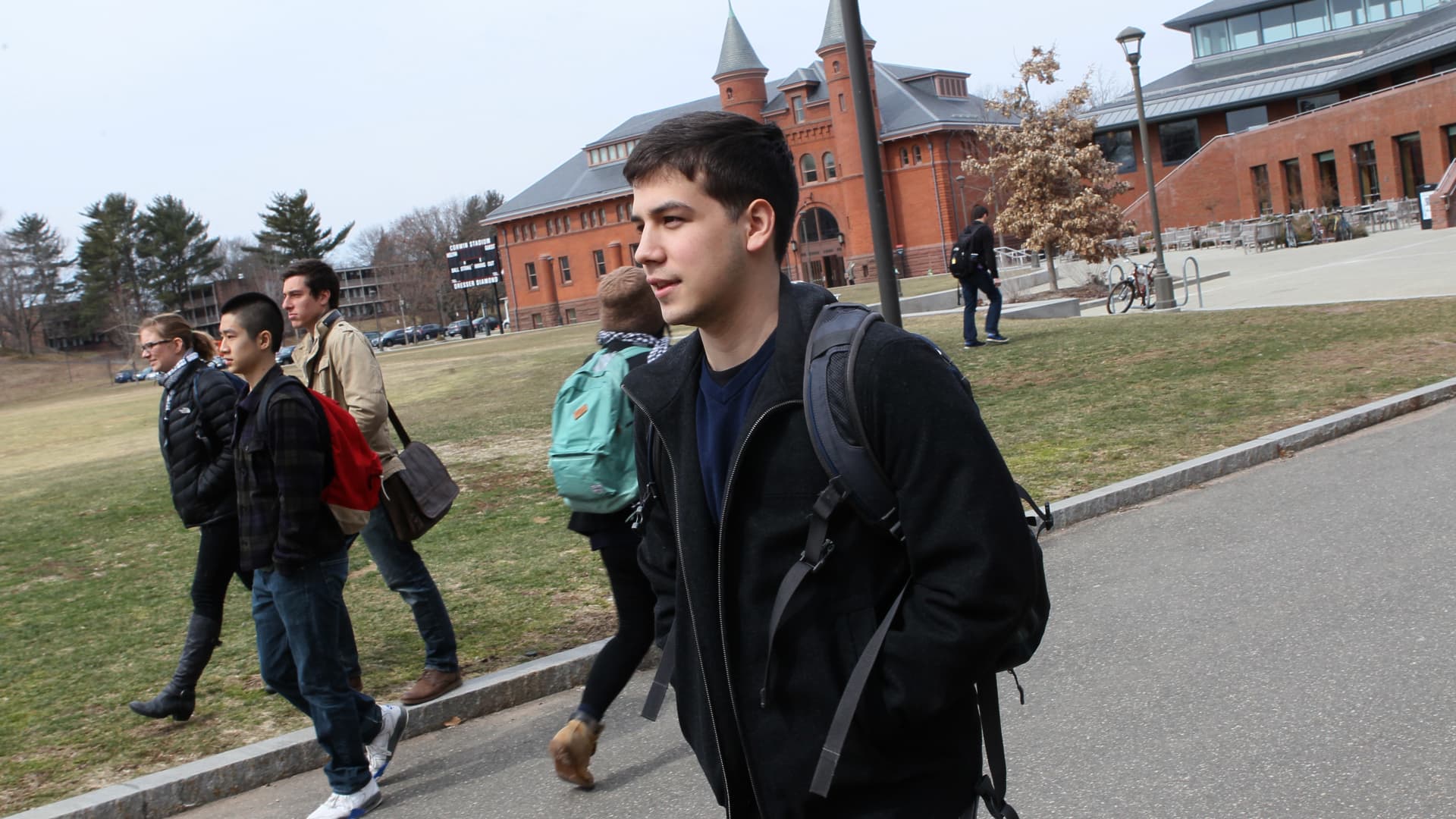In the wake of Supreme Court‘s ruling on affirmative action admission policies, Wesleyan University announced on Wednesday that it will end its policy of giving preferential treatment to legacy students.
“We still value the ongoing relationships that come from multi-generational Wesleyan attendance, but there will be no ‘bump’ in the selection process,” Wesleyan President Michael Roth said in a letter to the community.
The move by the Middletown, Connecticut school to end the practice of giving preference to legacy applicants in admissions was a direct response to the high court’s ruling, which is considered a massive blow to efforts to boost enrollment of minorities through policies that considered applicants’ race.
More from Personal Finance:
Quiet luxury may be Americans’ most expensive trend ever
Companies recognize importance of ‘out of office’ time
Cash-strapped consumers tip less amid persistent inflation
Other institutions, including Amherst College, Massachusetts Institute of Technology and Johns Hopkins University, have already phased out legacy admissions entirely.
Decades-old legacy preferences face new challenges
A civil rights group is also contesting the practice of giving priority to the children of alumni at Harvard University, saying it discriminates against students of color by giving an unfair boost to the mostly white children of alumni.
“Your family’s last name and the size of your bank account are not a measure of merit, and should have no bearing on the college admissions process,” Ivan Espinoza-Madrigal, executive director of Lawyers for Civil Rights, said in a statement announcing the civil rights complaint.
More Americans disagree with legacy admissions
Today, fewer Americans agree with legacy admissions.
Three-quarters, or 75%, said whether a relative attended the school should not factor into admissions decisions, up from 68% in 2019, according to a report by the Pew Research Center.
In its suit against Harvard, Lawyers for Civil Rights said it was challenging the “discriminatory practice of giving preferential treatment in the admissions process to applicants with familial ties to wealthy donors and alumni.”
Legacies are nearly six times more likely to be admitted, the complaint said.
“This preferential treatment overwhelmingly goes to white applicants and harms efforts to diversify color,” added Michael Kippins, litigation fellow at Lawyers for Civil Rights.
Officials at Harvard declined to comment on the complaint.
Challenges to legacy admissions mount
Several bills at the state and federal level have also taken aim at the practice, including a recent proposal in Massachusetts that would charge colleges a fee for considering legacy status or an applicant’s relationship to a past, current or prospective donor.
The NAACP called on more than 1,600 U.S. public and private colleges and universities to commit to increasing the representation of historically underrepresented students and end the practice of legacy admissions.
“That signifies a huge stride toward future insurance that every student, regardless of their race, ethnicity, gender identity, sexual orientation, disability, religion, or socioeconomic status, has an equal opportunity to learn, grow, and thrive at a higher education institution,” Ivory Toldson, director of education innovation and research at the NAACP, said in a statement.
The reality is we’ve reached a pretty good consensus on the use of identity in college admissions.Alvin Tillerydirector of Northwestern University’s Center for the Study of Diversity and Democracy
“There’s no doubt that the legacy advantage is mostly a white entitlement,” said Alvin Tillery, a political science professor and director of Northwestern University’s Center for the Study of Diversity and Democracy.
However, these preferences are not based explicitly on race, which distinguishes the practice from the overt race-conscious admissions programs that were recently rejected by the Supreme Court, noted Don Harris, associate dean and equity, diversity and inclusion liaison at Temple University School of Law.
Yet, “it’s clear that they have a disproportionate impact on race,” added Harris, referring to what Chief Justice John Roberts wrote in his opinion about preventing ways around affirmative action: “What cannot be done directly cannot be done indirectly.”
Legacy admissions ‘could be deemed unconstitutional’
Since the practice of legacy admissions has indirect racial implications, these challenges may have legal merit, according to Jeanine Conley Daves, an attorney at New York-based firm Littler.
If there is no compelling interest for such programs and they are having a negative effect on the college application process, “then similar to race-conscious admissions programs, it could be deemed unconstitutional,” she said.
“The reality is we’ve reached a pretty good consensus on the use of identity in college admissions,” said Tillery, who is also a Harvard graduate.
“If you can’t use race for Black and Latino students, then you can’t use race for wealthy white students either,” Tillery added.
The advantages that stem from legacy admissions can be hard to quantify but at some of the most selective colleges, legacies comprise as much as 10% to 20% of the incoming class, according to data from the Associated Press.
